Today, I’d like to wish you a wonderful and calm Christmas, and a most prosperous New Year 2026.
Thank you for reading my blog and let’s meet here in 2026!
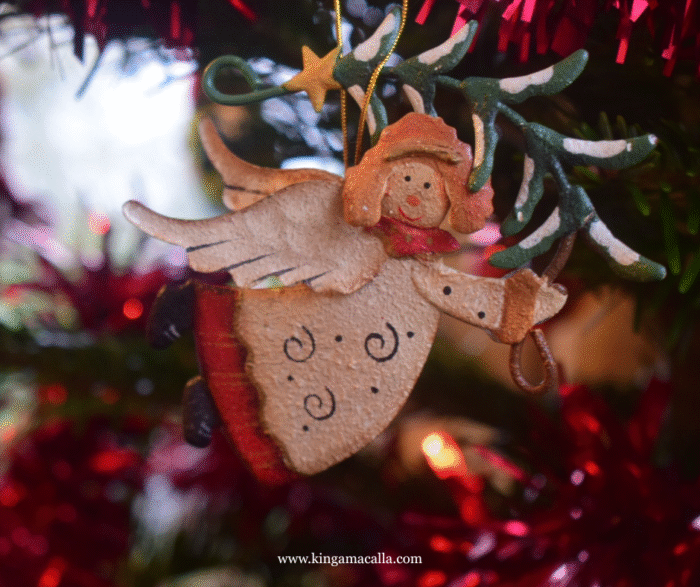
With love,
Kinga
Today, I’d like to wish you a wonderful and calm Christmas, and a most prosperous New Year 2026.
Thank you for reading my blog and let’s meet here in 2026!

With love,
Kinga
I read these books over the last few months. It’s an eclectic choice, but I think they might be perfect reading companions for the long winter evenings, or can be given as a Christmas gift for your loved one(s). The list was supposed to be longer with another three books, but I only managed to read these two. Also, there is my book review of Fluent Forever on the school’s blog. I hope to add the other three books soon and will update you about it.
The Blue Castle by L. M. Montgomery
If you have read Anne of Green Gables, you’ll love this book too. It takes us back in time, but the topics it touches (to some extent) are as relevant today as they were 10 decades ago. Uneasy family relationships, staying true to oneself, expressing one’s own thoughts and feelings, choosing to live to one’s own values. But, at the same time, it’s a heart-warming story, romantic and dreamy. I read it in a couple of evenings, as I was so curious to know how it all ends. A beautiful story.
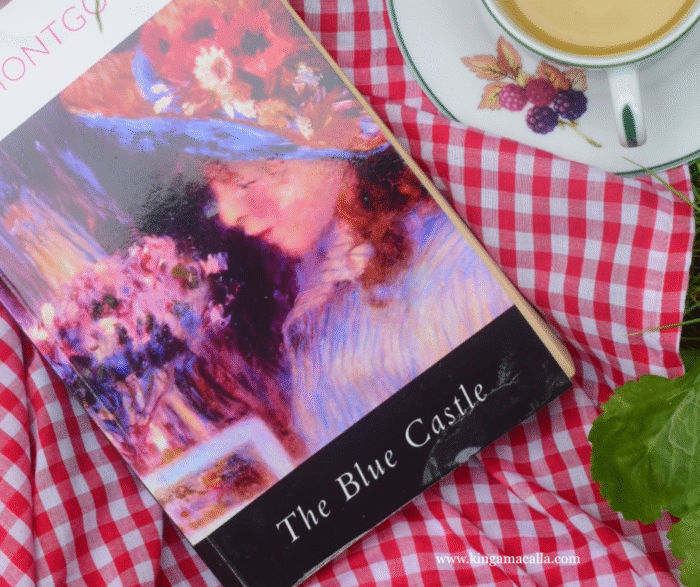
Atomic Habits by James Clear
“The greatest threat to success is not failure but boredom.” James Clear
When I ordered Atomic Habits at the library, I was number 146 in a long list of waiting readers, and eventually I got my copy after half a year. Once I read it, I understood why I had to wait so long: it’s a life-transforming read. Honestly, if you only read one book in 2026, let it be Atomic Habits. (Btw, last year I recommended Breath, have you read it?). Atomic Habits shows a different way of looking at motivation, goals and habits. I knew habits played an important role in our everyday life, but this book is solid proof of it. The book guides you through the process of building good habits and eliminating the bad ones. One of my favourite points is that you can start (very!) small. If you want to read books, start reading one page a day. That’s it! Just one page and see where it takes you after a while, especially when you start enjoying your short reads. And finally, a reminder if you progress too slowly: “Complaining about not achieving success despite working hard is like complaining about an ice cube not melting when you heated it from twenty-five to thirty-one degrees. Your work was not wasted, it is just being stored. All the action happens at thirty-two degrees.”
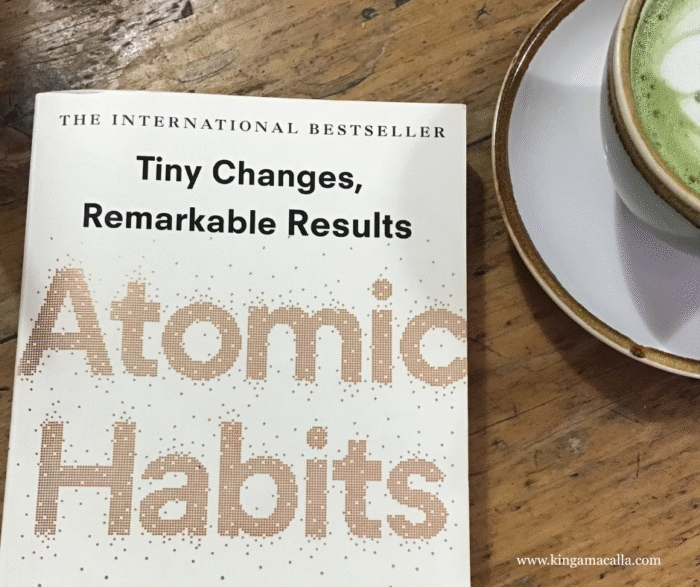
TBC…
This is one of my favourite Christmas cakes and I’ve been making it for many years now. I often bake the first gingerbread cake of the winter season at the beginning of December to start Advent and pre-Christmas preparations. Then I usually bake it every weekend in December, as it’s easy to make and yummy to eat. It’s a Polish tradition to eat gingerbread cake at Christmas and the recipe was inspired by Kwestia smaku. It’s gluten-free and you can make it healthier without sugar, eat it as it is, or make it fancy with plum jam and covered in melted chocolate. Enjoy!
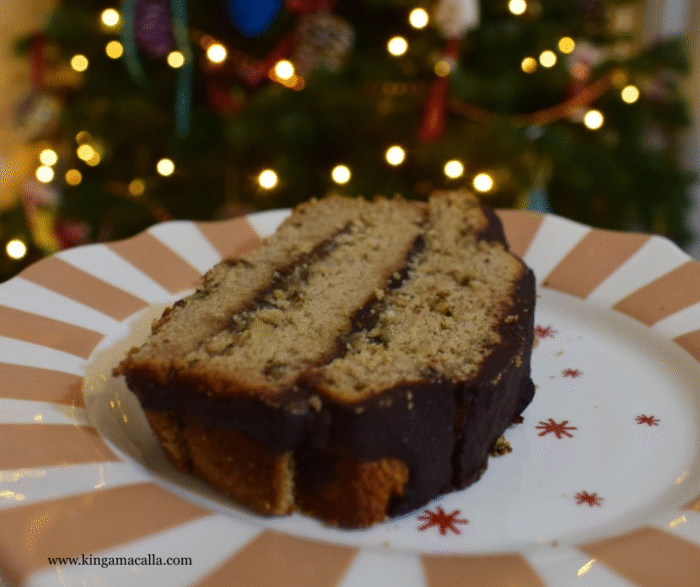
Here is the recipe:
Ingredients
130g butter, ghee or coconut oil
80g honey
30g sugar (you can add more / less or even omit it)
1-2 spoons of gingerbread spices
2 teaspoons of soda
300g flour (100g rice flour, 50g coconut flour, 50g almond flour (or grounded almonds), 50g potatoes flour, 50g corn flour)
250g milk (diary or plant, e.g. almond or hazelnut)
½ glass of finely chopped walnuts (optional)
2 eggs
Extra: you can fill it with plum jam and / or cover the cake in melted chocolate (1/3 glass of a coconut cream or diary cream and 100g of dark chocolate)
Preparation
Pre-heat the oven to 175 degrees. Use a loaf tin (cca 12x25cm) and line it with paper parchment. In a pan using a little heat, melt butter with honey, sugar (if used) and gingerbread spices. Take the pan off the heat and add all the flours and soda and mix it with a spoon. Add milk and walnuts (if used) and mix it and finally, add eggs and mix it again. Pour the dough into the loaf tin and put it into the pre-heated oven. Bake it for 40-45 mins: check if the cake is ready with a wooden skewer. Once ready, take it from the oven and cool it down. Keep it in a cake box.
You can fill the cake with a plum jam and/or cover it with melted chocolate (warm cream with chocolate up and keep stirring till it’s finely combined).
What’s your favourite Christmas cake? Please let me know in the comments below.
PS. If you’d like to try another Christmas recipe and bake ‘pierniczki’, Polish gingerbread biscuits, my recipe is on the school’s blog.
We read books in Polish and English and we have several of the same books in both languages, either because of available translations in those languages, or because we really enjoyed those stories. Sometimes it’s good to read the same story bilingually, to hear it in the languages we speak. For example, as an adult I read Harry Potter in three languages: in Polish, English and Czech. Reading the same book in translation gave me some context for another interpretation and the joy to understand it in more language(s).
A.A.Milne Winnie-the-Pooh // A.A. Milne Kubuś Puchatek
(originally published in English)
This is a classic and it was one of the first books we had in two languages. We read it chapter after chapter in Polish and then in English. We later found some audio-recordings which we listened to, as well. The stories are charming, as if we’re allowed to enter a magic world of teddy bears.
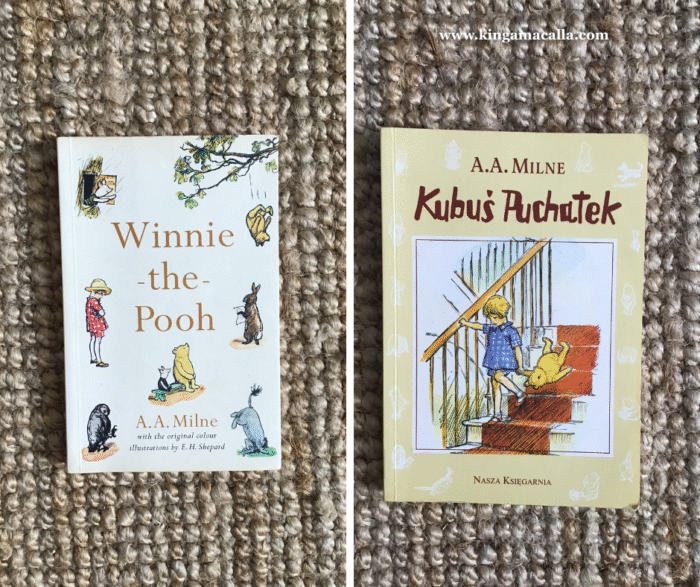
Astrid Lindgren The Children of Noisy Village // Astrid Lindgren Dzieci z Bullerbyn
(originally published in Swedish)
I read Astrid as a child and couldn’t wait to read those stories to my children. We love the noisy, courageous and joyful children who live together in a little village of Bullerby in Sweden. They have a simple life which is full of little adventures, childhood play and happiness.
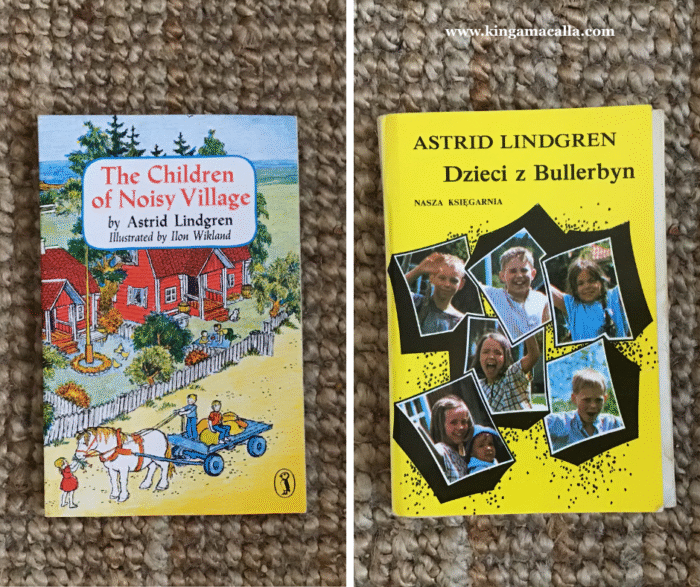
Astrid Lindgren Pipi Longstocking // Astrid Lindgren Pipi Puńczoszanka
(originally published in Swedish)
Pipi is a wonderful character who lives without her parents, with a horse and a monkey. Yes, she leads her life against the agreed way of doing things. Even though Pipi’s life is unusual, it’s also full of her kindness and generosity.
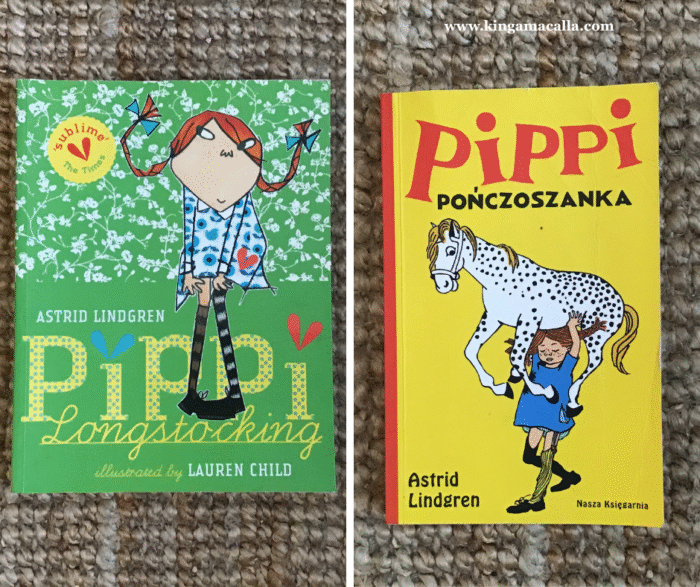
Elsa Beskow The Sun Egg / Elsa Beskow Słoneczne jajo
(originally published in Swedish)
This is one of the first books we read by Elsa Beskow, and we have this publication in Polish and in English. The Sun Egg is our summer read: it’s a short story about an elf who finds a ‘sun’s egg’ and together with forest animals, they try to find out what this round object actually is. Beautifully illustrated.
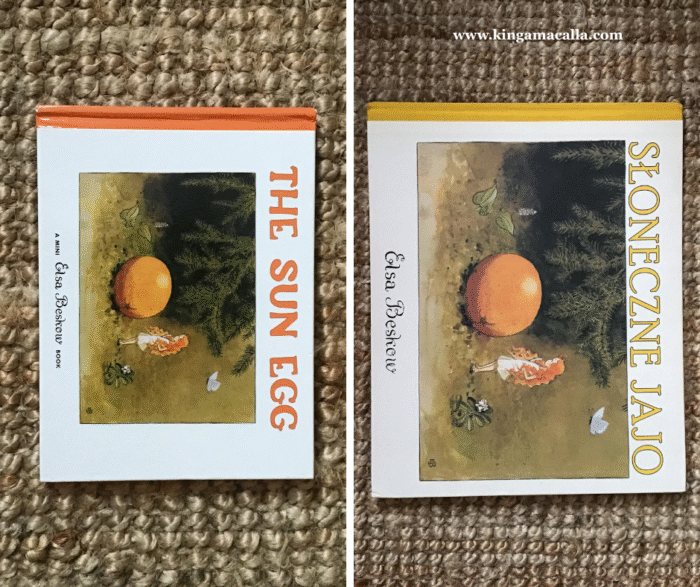
Clare Compton Harriet and the Cherry Pie // Clare Compton Cukiernia pod Pierożkiem z Wiśniami
(originally published in English)
We first found out about this novel as a Polish translation: we listened to an audiobook and then we read a book too. I then started searching for information about the author who actually turned out to be British–Clare’s real name was Hilda Hewett! Harriet and the Cherry Pie is a heart-warming story about an 11-year-old, Harriet, and her 6-year-old sister, Kitten. It’s a beautiful read, with some delicious recipes, like peppermint creams and chocolate crispies. It’s a shame that the book hasn’t been re-printed in English since 1968, and it’s only available second-hand.
Just to add that the Polish translation is absolutely scrumptious, as is the audio-recoding of the book.
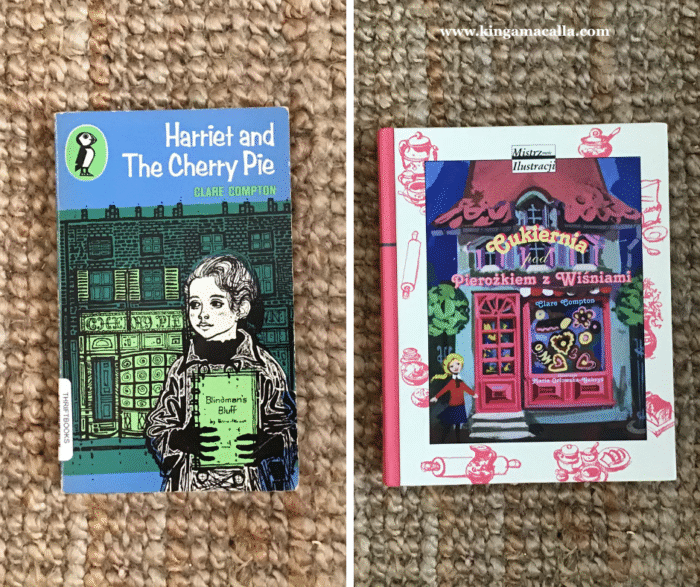
Aleksandra & Daniel Mizielińscy Maps // Aleksandra & Daniel Mizielińscy Mapy
(originally published in Polish)
This is a treat for children and adults. It’s beautifully illustrated and contains many useful and interesting facts about each country. You can go from country to country and your interest only grows, as you learn more about different countries, their food, nature, literature, sports, customs etc. Maps is a simple idea, but it is so cleverly executed!
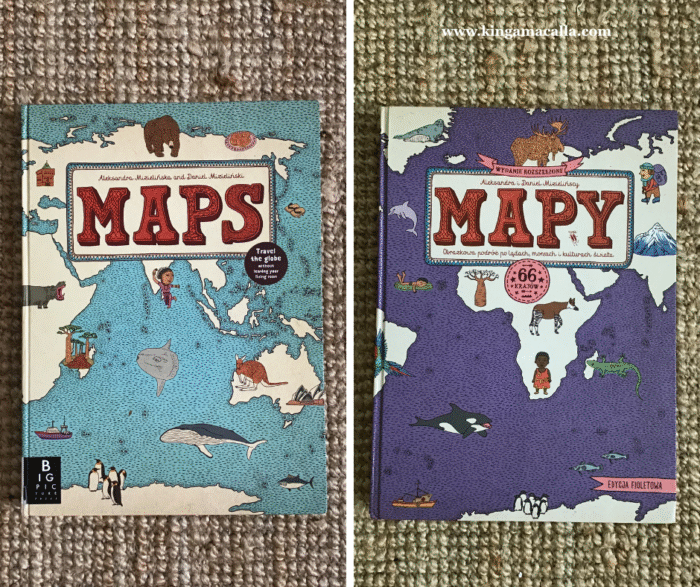
I hope you’ll find some inspiration in the above reading list. Please comment below if you have read any of the above with your children and let me know about you or your children’s favourite bilingual books.
Have you ever gone on your holiday with children by train? This is what we did this summer! It was exciting, but also required some good preparation, because we travelled with our 4 children (!). My view is that travelling starts the moment we step out of the house. Getting to our destination should be planned, but also as enjoyable as the time we spend on holiday. Here are some of the tips that helped us enjoy the journey by train.
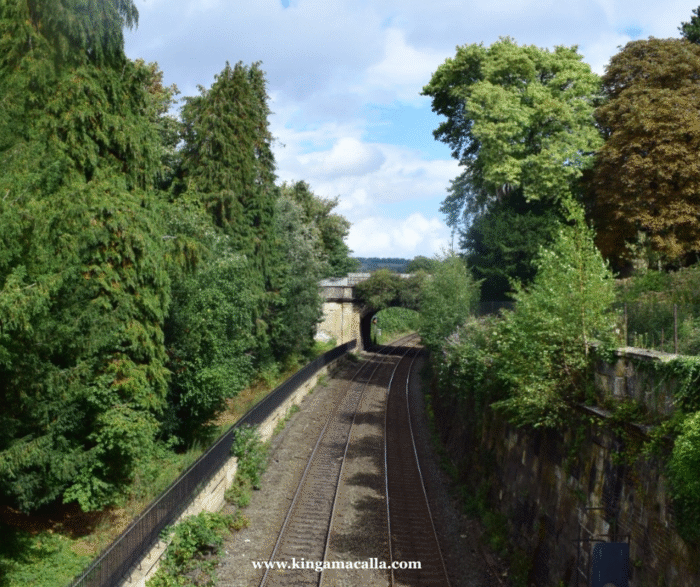
Check timetables in advance
If you travel by many trains, knowing precise timings of different trains and how much time you have to get from one platform to another is important. Don’t forget to check your trains back. Travelling home might be less exciting than going on holiday, so it’s good to have those timetables checked in advance too. Just for the peace of mind.
Packing
How do you pack for yourself and your family, so that you don’t have many very heavy bags? Essentials. You first think of all the things that you and your family actually need and then if you have some space in your luggage, you can add more items. This was our approach and it worked very well. However, I need to mention that we saw the same travellers travelling with us both ways, with children and they had such small luggage (in comparison to ours, obviously!), so I think for us there is still some room for improvement.
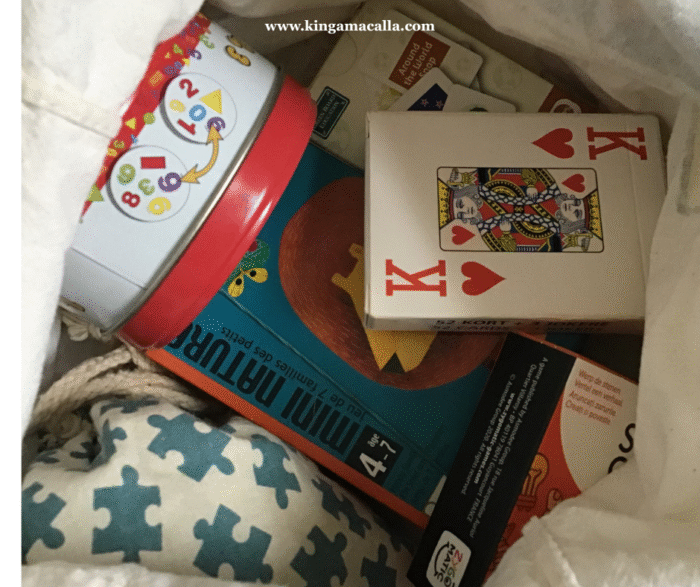
Hours by train
We spent around 5 hours on our journey to our travelling destination from door to door, so not very long, but we still wanted to travel prepared. We had a balanced plan for everybody’s entertainment: we took with us some cards, pocket family games, some individual activities (like drawing or colouring), a book to read, a notepad to take some notes, water, good food and snacks. I think we had this well organised and even though on our way back, we felt less excited and more tired, we still had good time playing games, chatting or doing nothing.
Have you travelled by train this year? Where to? Please let me know in the comments below.
[It’s a re-post from March 2021.]
When you teach a child something, you take away forever his chance of discovering it for himself. Jean Piaget
I read the book for the first time when I was doing my post-grad diploma in education. But now I’ve decided to return to this publication, especially since I became more involved in my daughters’ education.

The main message I took from this book is that education equals creativity. Education is an organic process (p. 41), because children are natural learners (p. 74). The learning process happens through play (p. 94) and it encourages mastery (p. 114).
The publication highlights some positive and inspirational stories and ideas about education, e.g. the world famous Finnish education system, Salmon Khan’s flipped classroom (p. 113) and teaching through and about the arts (p. 196).
Why read such publications? Because, I wouldn’t want learning and learners to be reduced to numbers in the future (p. 172) and I believe there might a more creative and organic approach to education.
Do you read books on education? What’s your most inspirational or favourite publication? Please let me know in the comments below.
I hope you’re well. It’s been a while since I wrote something here! A few months ago, we needed to find space for the language school’s page, so we used my personal page for our last term’s language courses.
Now the language school’s page has its own space (please see how wonderful the autumn language courses look!) and now I can re-start blogging here again. It feels good to be back!

Today, I’d like to say a few words about new mums. Since recently welcoming a new pair of little feet to our family, I have become one of them (again!). When walking with my little miracle or meeting friends, many people have complimented me with the phrase ‘You look good!’, sometimes with a surprised tone: Hey, a new mum can look beautiful. Those complements reminded me how important it is to take care of myself, even when it’s not always possible (!). Whenever possible I try to treat myself with self-respect and pay attention to my daily routine and rituals to make sure I prepare and eat heart-warming meals, have time to rest, read a good book (a very good companion when breastfeeding!), go to bed early (even just to quietly meditate or read a book), listen to music I like, and move my body (for now it’s walking and doing a happy dance). Today, I’m raising my glass of water to all new mums for your well-being and beauty. Cheers to long milky days!

To all my readers, I hope to write another post soon. Meanwhile, I’d like to wish you a wonderful summer.
Thank you for being my reader.
Our autumn timetable is ready! Please click the link to enrol on our autumn language courses or see our current offer below:
Arabic
Beginner Level 1 Course: Course programme
Beginner Level 2 Course: Course programme
Elementary Level 1 Course: Course programme
Elementary Level 6 Course: Course programme
Intermediate Level 9 Course: Course programme
Please click the link to enrol on our autumn language course.
By booking our language course, you agree with our T&C.
Chinese (Mandarin)
Beginner Level 1 Course: Course programme
Beginner Level 2 Course: Course programme
Elementary Level 1 Course: Course programme
Please click the link to enrol on our autumn language course.
By booking our language course, you agree with our T&C.
French
Beginner Level 1 Course: Course programme
Please click the link to enrol on our autumn language course.
By booking our language course, you agree with our T&C.
German
Beginner Level 1 Course: Course programme
Beginner Level 2 Course: Course programme
Elementary Level 2 Course: Course programme
Elementary Level 5 Course: Course programme
Intermediate Level 3 Course: Course programme
Upper-Intermediate Course: Course programme
Please click the link to enrol on our autumn language course.
By booking our language course, you agree with our T&C.
Italian
Beginner Level 1 Course: Course programme
Beginner Level 2 Course: Course programme
Please click the link to enrol on our autumn language course.
By booking our language course, you agree with our T&C.
Japanese
Beginner Level 1 Course: Course programme
Please click the link to enrol on our autumn language course.
By booking our language course, you agree with our T&C.
Korean
Beginner Level 1 Course: Course programme
Please click the link to enrol on our autumn language course.
By booking our language course, you agree with our T&C.
Polish
Beginner Level 1 Course: Course programme
Elementary Level 7 Course: Course programme
Intermediate Level 8 Course: Course programme
Please click the link to enrol on our autumn language course.
By booking our language course, you agree with our T&C.
Portuguese
Beginner Level 1 Course: Course programme
Beginner Level 2 Course: Course programme
Elementary Level 1 Course: Course programme
Intermediate Level 5 Course: Course programme
Please click the link to enrol on our autumn language course.
By booking our language course, you agree with our T&C.
Russian
Beginner Level 1 Course: Course programme
Intermediate Level 2 Course: Course programme
Please click the link to enrol on our autumn language course.
By booking our language course, you agree with our T&C.
Spanish
Beginner Level 1 Course: Course programme
Beginner Level 2 Course: Course programme
Elementary Level 1 Course: Course programme
Please click the link to enrol on our autumn language course.
By booking our language course, you agree with our T&C.
Please get in touch if you need your level assessed or you need more information about our language courses: office@bls-courses.co.uk & +44 (0)7938038875.
If you’re interested in individual tuition (general, business or exam preparation), please follow the link.
Thank you for learning languages with Bristol Language School.
BLS Team
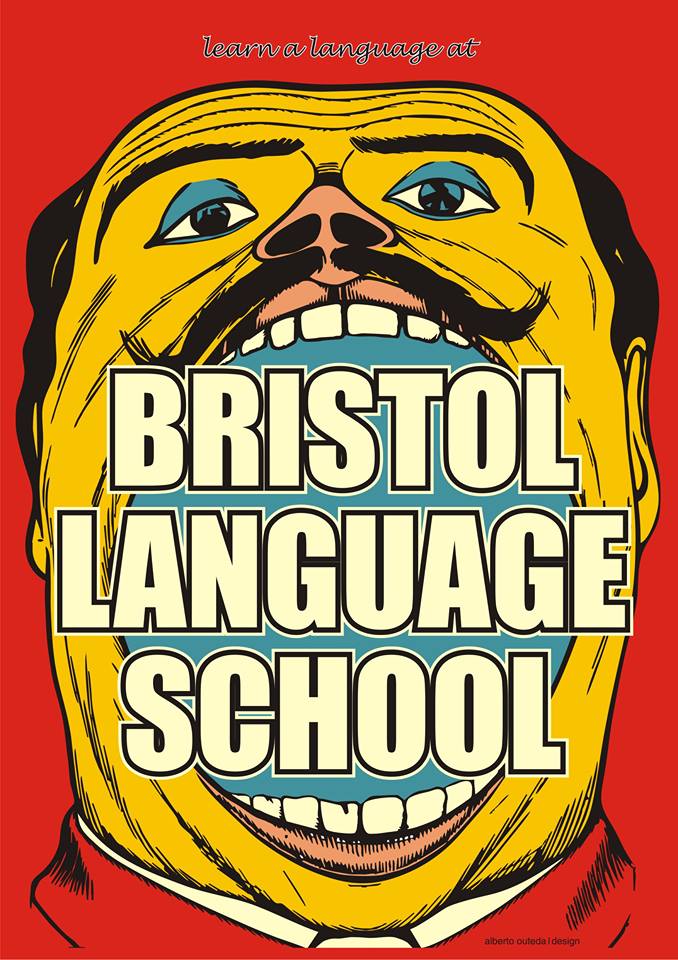
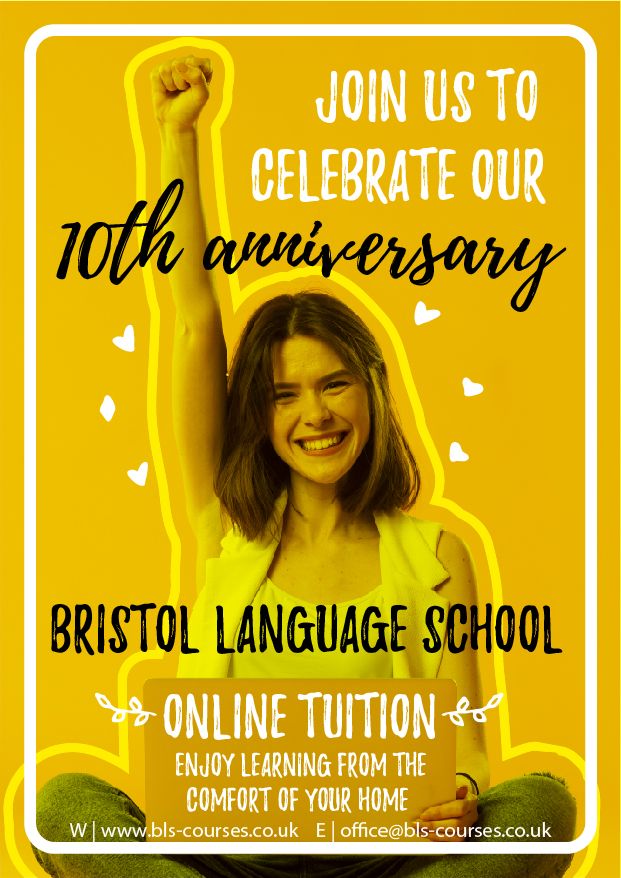

“If I had to limit my advice on healthier living to just one tip, it would be simply to learn how to breathe better.” Andrew Weil
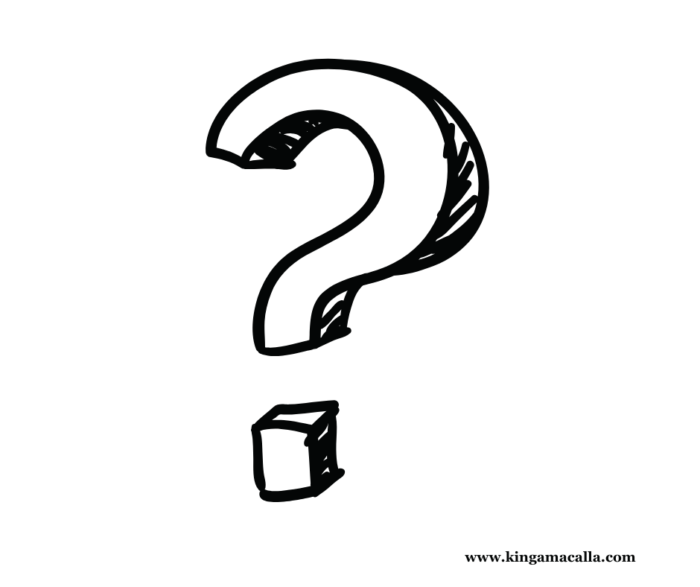
As we’re approaching the end of 2024, I think I’m brave to say that if there is one book you read in 2025, let it be Breath by James Nestor. For your health, well-being and overall sanity. Yes, I’m serious. I read it a few months ago, but waited for the right (aka free!) moment to put together this short review, as I wanted to recommend this book to you. I found this publication fascinating: from knowledge of the past, interesting experiments, scientific facts to practical advice. While reading the book I was becoming more and more aware of my own breath, and I slowly started re-discovering the beauty of breathing. To introduce any changes into my breathing practice sounded so simple, but in reality, it was and still is much more challenging. I’m not going to share more details about this book, as I don’t want to spoil the pleasure of reading it yourself, and discovering the story behind our own breath.
As I’m publishing my words in December, I’m taking this opportunity to wish you a wonderful and calm Christmas, and a most prosperous New Year, 2025! Thank you for reading my blog and let’s meet here in 2025!
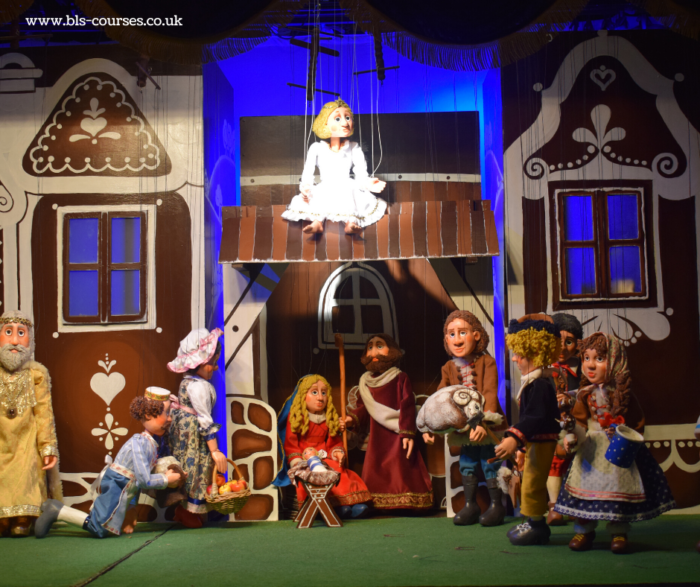
With love, Kinga
I last wrote here in July and it feels exciting to be back with a travel story after a while. We first visited Exmoor 10 years ago in early autumn, then we returned to this region five years ago and that was in winter. This year, we went back in the autumn. The weather was nice: some sunshine, mostly cloudy (but it didn’t rain!).
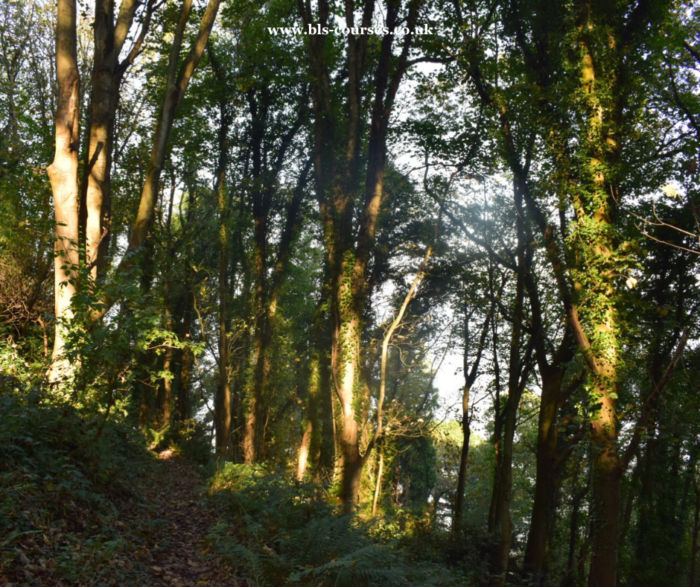
Slowing down
We didn’t plan much for our stay in Exmoor. I think it can be difficult to slow down when travelling or on holiday, and I try to do my best to actually relax. To be able to enjoy my morning (barley!) coffee without any rush, chatting about everything with my family or reading for pleasure. Exmoor is surrounded by beautiful nature, hills, sea and ancient forests, so even having a walk is a treat in itself.
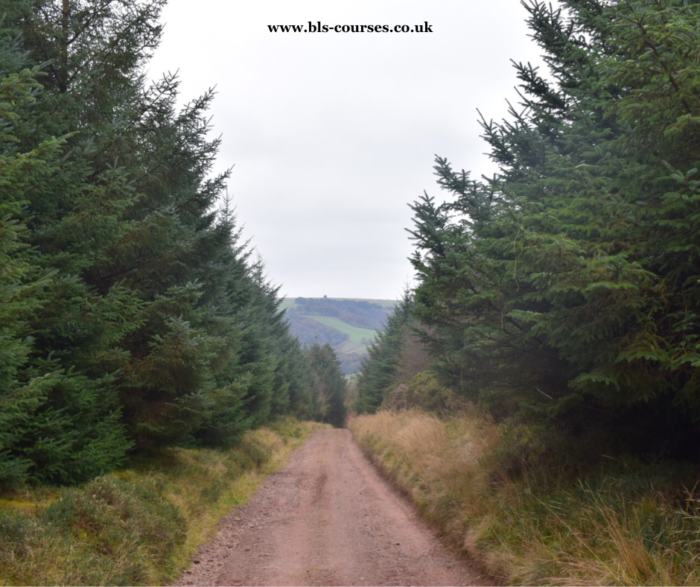
Walking
Walking in Exmoor is a different level of experiencing nature. When we went in the autumn, we felt the smells of the mushrooms and damp soil, the colours were beautiful and falling leaves made the walking experience more magical.
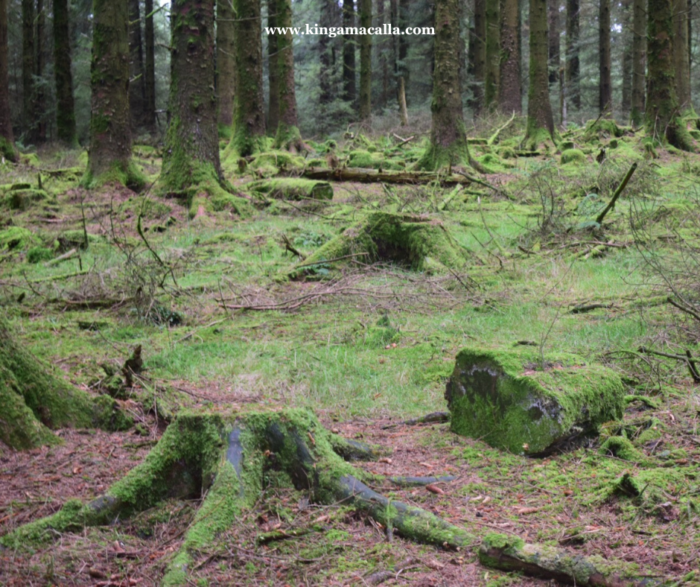
Minehead
We enjoyed starting our time in Exmoor by climbing the North Hill which begins in Minehead. We didn’t manage to reach the peak this year, but walking was fulfilling our need to just be in nature. While in Exmoor, we also went to visit the tiny museum in Minehead; it’s opposite the steam train station (oh yes, you can go on a stream train ride from Minehead!). I enjoyed reading about Punch and Judy, who were local marionettes giving shows in Minehead – it’s a shame that this puppetry tradition belongs to the past now. We also visited our favourite place, The Toucan Café, which serves delicious dark hot chocolate (of course, it needs to be dark!).
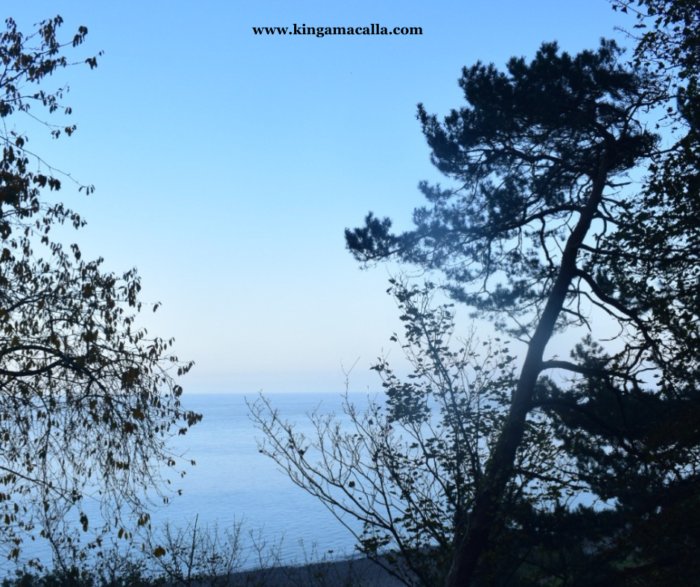
What are your memories from visiting Exmoor? Please let me know in the comments below.